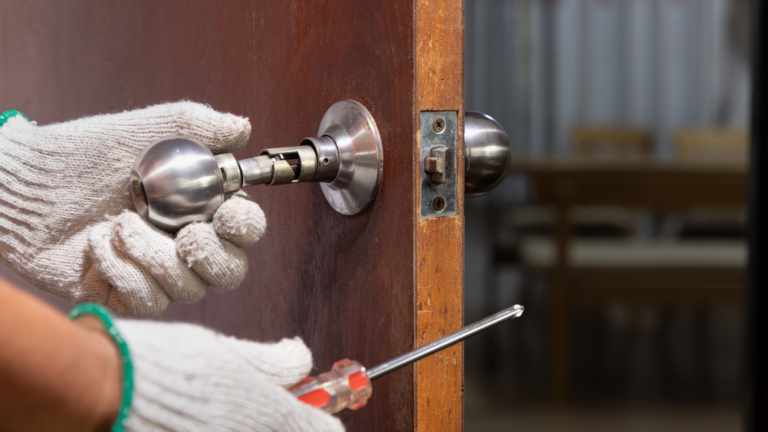Locks are important for home security, but they can experience problems that compromise their effectiveness. It’s crucial to address these issues promptly to maintain safety. In this section, we explore prevalent lock issues, offering comprehensive insights and further solutions to keep your locks in top form.
Locks That Stick and Are Difficult to Turn
Causes
The primary reasons for malfunctioning locks are rust development, debris buildup, and worn-out internal parts. Dust and grime can build up inside the lock mechanism over time, diminishing its effectiveness. Rust can form in locks exposed to moisture, especially older ones or those subjected to the elements. Additionally, continuous use can wear out internal components, leading to more lock issues.
Comprehensive Solutions
If you can disassemble the lock, thoroughly clean the internal components using a gentle brush and suitable cleaner to remove any built-up debris and old lubricant. Regularly lubricate locks and maintain a clean surrounding area to prevent debris from interfering with the lock.
Striker Plates and Locks in Misalignment
Causes
Building structural settling can cause doors and frames to move over time. Moreover, fluctuations in weather conditions can lead to materials expanding and contracting, which may misalign doors and frames.
Comprehensive Solutions
Start by using a screwdriver to tighten the hinges and adjusting shims to ensure correct door alignment. If the latch is out of alignment with the striking plate, remove it and reinstall it in the proper location, which can include creating new space with a chisel. Moreover, upgrading or replacing weather stripping can improve door alignment and prevent future misalignment problems, ensuring the door operates smoothly and fits securely within its frame.
Keys that Have Broken
Causes
Keys develop weak points over time, particularly with frequent use or exposure to force, which may affect their integrity. Additionally, with repeated use, metal wear and tear occur, increasing the likelihood of breakage.
Comprehensive Solutions
Start by carefully catching and extracting the broken fragment of a broken key from a lock using a key extractor tool or a small jigsaw blade. It is advised to frequently check keys for wear and make duplicates before they become worn out. Using very worn keys is not recommended in order to avoid breaking them. If you are having trouble getting the broken key out, think about calling a locksmith who can use specialized tools to safely retrieve it.
Wobbly or Loose Lock Mechanisms
Causes
High-traffic areas often cause locks to become loose due to frequent use, which wears out their mechanisms. Improper installation of locks can contribute to them loosening over time if they were not securely fastened at the outset.
Comprehensive Solutions
To maintain functionality, begin by removing the cover and tightening all visible screws. Ensure the lock mechanism is securely in place within the door. Furthermore, noticing any worn-out parts may necessitate replacing the entire lock mechanism to sustain its effectiveness.
Need a locksmith? Don't Worry!
Our expert locksmiths are available 24/7. We're here to help with all your emergency lock needs. Don't hesitate, call us now!
Key Won’t Insert Fully
Causes
Items or debris from outside can block the keyway, disrupting the smooth operation of the lock. Moreover, a bent or damaged key might prevent full insertion, affecting the lock’s functionality. Both issues should be addressed promptly to maintain smooth key operation and secure the lock.
Comprehensive Solutions
Start by ensuring proper lock function with a thin, non-metallic tool to clear any visible debris from the keyway. Then, inspect the key for bends or damage and replace it with a new one to prevent complications. Should the issue continue, consider contacting residential locksmiths in Springfield, PA who can carefully inspect and clean the lock’s internal components for maximum performance and security.
Lock is Frozen
Causes
The freezing of moisture inside a lock in cold temperatures can affect its operation. Severe weather can cause locks to freeze if not properly weatherproofed, impacting their functionality. Ensuring locks are adequately shielded from the elements is essential to prevent moisture buildup and freezing.
Comprehensive Solutions
Thaw a frozen lock quickly using a lock de-icer spray formulated with alcohol or similar substances known for melting ice effectively. Applying a lubricant before the cold season helps to repel moisture, and installing a lock cover provides defense against harsh weather conditions. Should the lock persist in being frozen, heat the key carefully with warm water or a lighter before inserting it to melt the ice inside the lock.
Homeowners may maintain the security and functionality of their locks by swiftly addressing common problems and recognizing when expert assistance is needed. Regular maintenance, timely upgrades, and proper care are pivotal in upholding the integrity and reliability of your home’s locking systems.
If you’re dealing with issues concerning your home’s locks and need a solution, consider consulting residential locksmiths in Springfield, PA. Our skills and specialized tools empower us to handle different lock-related concerns, enhancing property security and providing peace of mind. Call us today without hesitation!

